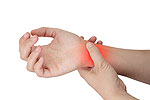 Osteoporosis is a very significant health issue and indeed can lead to fatal consequences. The road from brittle bones, to suffering a fall and fracturing a bone, to being hospitalized and suffering an illness in the hospital, and not ever leaving the hospital is not a fictional one. Here I look at how vitamin K could help prevent osteoporosis despite most people not making that connection.
Osteoporosis is a very significant health issue and indeed can lead to fatal consequences. The road from brittle bones, to suffering a fall and fracturing a bone, to being hospitalized and suffering an illness in the hospital, and not ever leaving the hospital is not a fictional one. Here I look at how vitamin K could help prevent osteoporosis despite most people not making that connection.
Postmenopausal osteoporosis and steroid-induced osteoporosis account for the majority of patients with osteoporosis. And, as most of us know, women are at highest risk for this condition. Here are five studies worth noting about how vitamin K supplements could help postmenopausal women with osteoporosis.
1998: 45 milligrams (mg) a day of vitamin K2 prevented loss in bone mineral density.
2000: 45 mg a day of K2, as well as some vitamin D, increased bone mineral density.
2002: Same as above led to the same results as above.
2003: One mg of K1 a day reduced bone loss in bone mineral density.
2006: 45 mg a day of K2 increased bone mineral density.
In high-quality studies from 1966 to 2005, where vitamin K was used for six months, 19 out of 20 proved that vitamin K could help prevent bone loss. That is very impressive. Also, vitamin K2 had a profound effect on the reduction of bone fractures in Japan.
Osteoporosis can also be triggered by steroidal medications used over the long term. Vitamin K, many studies have discovered, works here as well. It could lower the rate of bone loss, slow down the loss, and even increase bone mineral density in some cases. Vitamin K supplements have also worked for osteoporosis linked with certain other cases: anorexia; bedridden patients; biliary cirrhosis; Parkinson’s disease; people who take bisphosphates (drugs for osteoporosis); and those who take leuprolide (a drug commonly used to treat endometriosis, prostate cancer, and leiomyoma.
In short, we must think beyond calcium when thinking about bone health. Calcium, vitamin D, magnesium — and vitamin K — are all critical in preserving your skeleton well into the twilight years.
